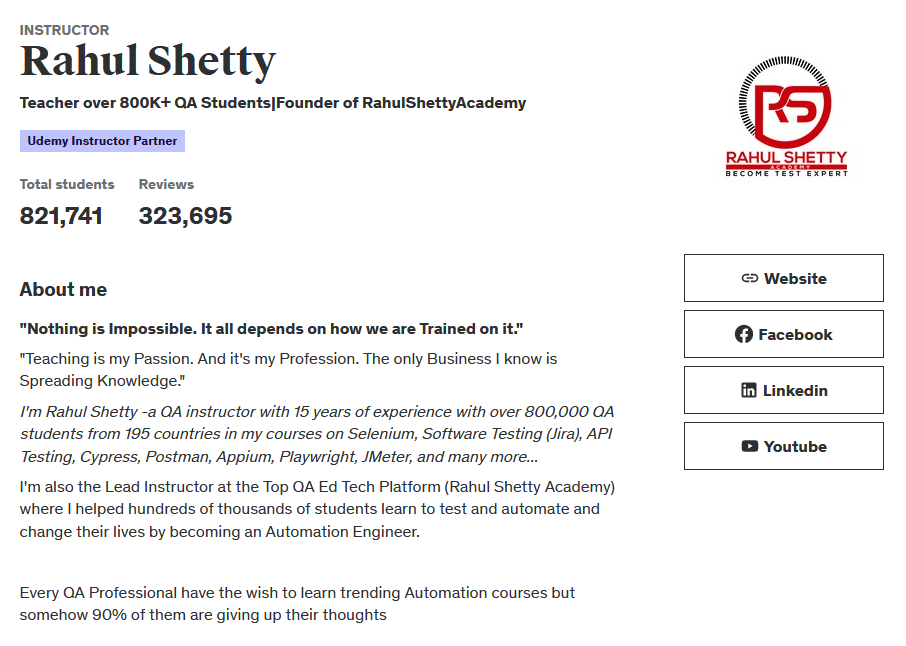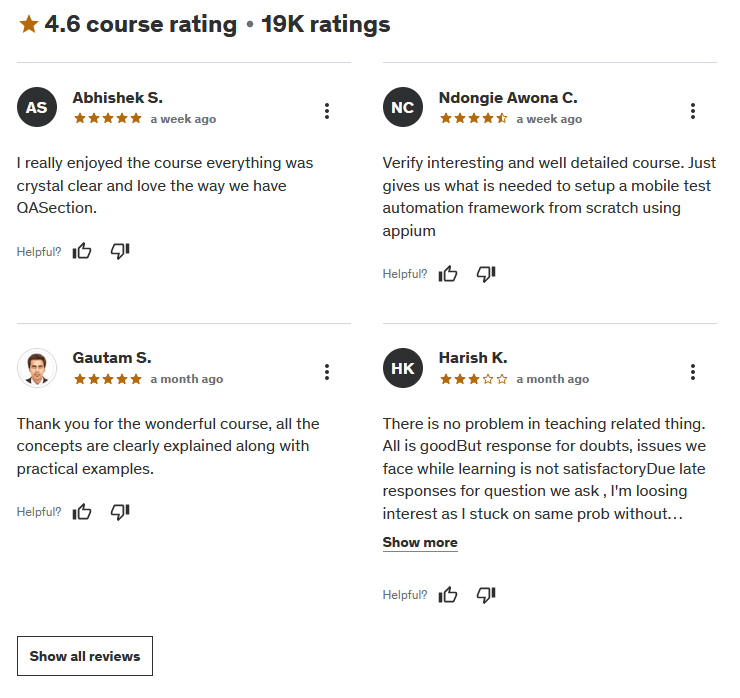In today’s digital age, mobile app testing has become crucial for developers and QA engineers alike. The course “Appium -Mobile Testing (Android/IOS) from Scratch+Frameworks” by Rahul Shetty on Udemy caught my eye as a promising resource for both beginners and experienced testers. With its promise to master mobile automation testing and its comprehensive curriculum, I dove in to see if it lives up to the hype. Here’s my take on it.
Instructor Reputation
When diving into the world of online learning, the instructor’s reputation can often be the make-or-break factor for students deciding on a course. In the case of the “Appium – Mobile Testing (Android/IOS) from Scratch+Frameworks” course on Udemy, Rahul Shetty stands out not just as a knowledgeable instructor but as a beacon for aspiring QA engineers and testers. With an impressive instructor rating of 4.6, backed by over 323,695 reviews and a student base of 821,741 across 29 courses, Rahul’s credentials speak volumes about his impact and expertise in the QA and software testing domain.

Rahul Shetty is not just another instructor on the internet; he’s a seasoned professional with 15 years of experience in the QA field, having navigated through the intricacies of software testing, automation, and QA methodologies. His journey from a practicing QA engineer to a mentor for over 800,000 students globally is a testament to his passion for teaching and his commitment to spreading knowledge. What sets Rahul apart is his ability to demystify complex concepts in automation testing and present them in a digestible and engaging manner. His courses, especially on Appium mobile testing, are structured to cater to both beginners with no coding background and experienced testers looking to upgrade their skills.
The feedback from students enrolled in his courses further cements Rahul’s standing as a top-tier instructor. Learners often highlight his clear and concise teaching style, the practical applicability of the course content, and his responsiveness to student queries. This level of interaction and support is rare in the online learning space and underscores Rahul’s dedication to his students’ success.
Moreover, Rahul’s philosophy that “Nothing is Impossible” resonates through his teaching methodology. He encourages students to approach learning with an open mind and a can-do attitude, making even the most daunting topics accessible. His belief in the transformative power of education, especially in the tech and QA arenas, is evident in the success stories of his students who have gone on to secure high-paying jobs and lead automation projects.
In the rapidly evolving field of mobile app testing, having a mentor like Rahul Shetty can significantly impact one’s career trajectory. His courses are not just about passing on knowledge; they are about instilling confidence and competence in his students, preparing them for the challenges of the QA world. Rahul’s reputation as an instructor is not just built on the number of courses he’s taught or the students he’s reached but on the tangible outcomes and career advancements his teachings have facilitated.
Course Structure
The “Appium -Mobile Testing (Android/IOS) from Scratch+Frameworks” course is meticulously structured to cover every facet of mobile automation testing, ensuring a thorough understanding for students across different levels of expertise. The course structure is one of its most compelling attributes, designed to take students on a progressive learning journey from the basics of Appium to advanced framework design and CI/CD integration.

Introduction and Basics
The course begins with a solid foundation, introducing students to the world of mobile testing and the significance of Appium in the QA industry. This section is crucial for setting the context and ensuring that even those with minimal to no programming experience can grasp the fundamental concepts. It includes an overview of the Appium architecture and its ecosystem, making it easier for students to understand how Appium fits into the mobile testing landscape.
Environment Setup and First Steps
Following the introduction, the course dives into the practical aspects of setting up the testing environment. This includes detailed guidance on installing Appium, configuring simulators/emulators, and preparing real devices for testing. The emphasis on a hands-on approach from the outset encourages students to engage with the tools and technologies they’ll be using throughout the course.
Core Concepts and API Usage
As students become comfortable with the setup, the course progresses to more in-depth topics, such as Appium’s internal APIs, command usage, and automating different types of mobile applications (native, hybrid, and web). This section is the heart of the course, where Rahul’s expertise shines through in his detailed explanations and tips for optimizing automation scripts.
Framework Design and Advanced Topics
One of the course’s highlights is its focus on designing industry-standard mobile testing frameworks from scratch. Students learn to integrate Appium with popular tools and technologies like Maven, TestNG, Jenkins, Git, and Extent Reports, among others. This section not only equips learners with the technical skills required for modern QA environments but also fosters a deeper understanding of best practices in automation testing.
CI/CD Integration and Real-World Application
In the concluding sections, the course covers the implementation of continuous integration and delivery (CI/CD) pipelines using Appium. It delves into parallel execution on real devices and cloud infrastructure, preparing students for the complexities of real-world testing scenarios. This comprehensive approach ensures that by the end of the course, learners are not just proficient in Appium but are also capable of designing and executing automation strategies in professional settings.
Continuous Learning and Support
A standout feature of the course structure is the ongoing support and updates provided by Rahul Shetty. The course material is regularly updated to reflect the latest versions of Appium and associated technologies, ensuring that students always have access to the most current information. Additionally, the lifetime Q/A support offered by Rahul allows students to seek guidance and clarify doubts, fostering a continuous learning environment beyond the course duration.
In conclusion, the structured approach to learning Appium mobile testing offered in this course is comprehensive, practical, and aligned with industry standards. It is designed not just to impart knowledge but to build competence and confidence in students, preparing them for successful careers in mobile automation testing.
Content Quality
The “Appium -Mobile Testing (Android/IOS) from Scratch+Frameworks” course sets a high standard in the realm of online technical training, especially in content quality. The meticulously curated course material stands out for its clarity, depth, and relevance, making it a standout resource for anyone keen on mastering mobile automation testing.

Clarity and Comprehensibility
One of the course’s strongest points is the clarity of instruction. Rahul Shetty has a knack for breaking down complex topics into digestible pieces, making it accessible to learners of all backgrounds. This is particularly beneficial for students who are new to programming or mobile testing, as the course begins with the basics of Appium, gradually moving towards more complex subjects. Each concept is explained with the aid of visual aids, real-world examples, and hands-on exercises that reinforce learning.
Depth of Material
The content does not shy away from depth. It covers a wide range of topics essential for a comprehensive understanding of mobile app automation, from the fundamentals of Appium’s architecture to advanced framework design and CI/CD integration. The course goes beyond mere surface-level instruction, delving into the nuances of automating different types of applications (native, hybrid, web) on both Android and iOS platforms. Such depth ensures that learners not only grasp the basics but also gain insights into the practical challenges and solutions in mobile testing.
Relevance and Applicability
Rahul Shetty’s course stands out for its focus on the practical applicability of the content. The course material is designed to be immediately relevant to the work of a mobile automation tester, with an emphasis on real-world applications. This relevance is further underscored by the inclusion of industry-standard tools and technologies like Maven, TestNG, Jenkins, and others, ensuring learners are well-prepared for the demands of the job market.
Continuous Updates and Resources
The commitment to keeping the course material up-to-date with the latest versions of Appium and related technologies is another testament to its quality. This dedication ensures that students are learning the most current practices and are not left behind as the technology evolves. Additionally, the wealth of resources provided, including code dumps, theoretical material, and interview guides, enhances the learning experience and provides students with tools to succeed beyond the course.
Student Engagement and Support
Finally, the interactive elements of the course, such as quizzes, assignments, and the opportunity to engage with the instructor and peers through the discussion board, contribute significantly to the content’s quality. This interactive approach not only aids in the consolidation of learning but also creates a supportive community of learners.
Overall Course Rating – 9.5/10
Considering the comprehensive coverage, depth, clarity, relevance, and the continuous updates of the course content, along with the exceptional teaching methodology of Rahul Shetty, I would rate “Appium -Mobile Testing (Android/IOS) from Scratch+Frameworks” a solid 9.5 out of 10. The course excels in preparing students for real-world mobile testing scenarios, equipping them with the necessary skills to navigate both Android and iOS platforms proficiently.

The half-point deduction from a perfect score reflects room for improvement in areas such as expanding on parallel execution strategies and including more content on Behavior-Driven Development (BDD) with Appium. Addressing these topics could further enhance the course’s comprehensiveness and applicability, catering to an even wider audience interested in the nuances of mobile testing.
In summary, this course is an exceptional learning resource that stands out for its high-quality content, practical relevance, and the instructor’s commitment to student success. It is an invaluable asset for anyone looking to enter or advance in the field of mobile automation testing. The course not only provides a thorough education in Appium but also inspires confidence in students to tackle the challenges of mobile testing, making it a highly recommended course for aspiring mobile automation engineers.



